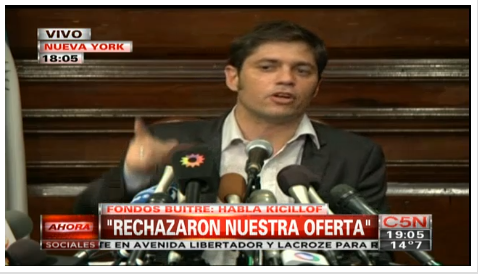That was the Argentine economy minister, Axel Kicillof, shortly before pixel time, having announced a (rejected) ‘offer’ of the same terms as Argentina’s restructured debt to the holdouts; blamed Judge Griesa; and otherwise prepared his country for default. Direct negotiations, in short, are over for now.
There’s still the sliver of hope that Argentine banks will eventually make a private deal with the holdouts to get an extension of talks. Within minutes of Kicillof’s press conference ending, the Argentine press lit up with reports of this.
Still, Special Master Daniel Pollack sounded crestfallen:
I have worked relentlessly, over a five-week period, to bring the Republic of Argentina and its bondholders together in an agreement that would allow the June 30 interest payment of many hundreds of millions of dollars to be made, and to be made lawfully, thereby avoiding Default. It is not my role or intent to find fault with either side. I will continue to be available to the parties to aid them in reaching a resolution which they must reach in the interests of all concerned…
Which brings three questions to mind for the restructured bondholders (and the market) now, we guess.
1) Do you trust your sovereign bond trustee? From Anna Gelpern:
Once default happens… 25% of any series of Argentina’s Discount Bonds can vote to demand full principal and unpaid interest for that series. Thereafter, the same percentage can vote to instruct BNYM to sue Argentina, provided they put up the necessary indemnities for BNYM. If Argentina deposits the past-due payment with BNYM, 50% can vote to rescind the acceleration–WAIT. Argentina has deposited the payment with BNYM. Does it mean that Argentina both defaults and cures at the same time? …
Bank of New York has, after all, had a pretty rough pari passu saga, as it became sucked into the injunction through Argentina’s attempted, pari passu-violating, payment of just the restructured debt last month. The indemnity for any lengthy litigation may be fairly large… and it’s not as if the sovereign bond trustee business is high-margin anyway.
2) Who wants to accelerate on Argentina first (ie. declare default and demand full payment)? Also from Anna:
If your investment strategy benefits from a broad-based default, and if you have enough friends in the same series to muster 25%, yes. If you wish it would all go away and/or do not have the voting power to accelerate, then no. To know more, you need to know who holds which bonds, and what their game plan might be.
There’s every incentive for any and all bondholders to accelerate as a formality — ie. as insurance if Argentina gets recalcitrant with everybody. But very few, we’d imagine, expect to gain any serious legal advantage by accelerating.
In particular, cross-accelerating bonds will look a bit silly if Argentina cures the default within 60 days anyway.
Argentina could come back and make a holdout deal (and cure default) relatively soon after all — if it overcomes its prisoner’s-dilemma type fears of RUFO lawsuits from restructured holders.
And for those things to happen with Argentina, the best collective attitude for restructured holders is to play nicely. Otherwise, accelerating/litigating for full payment is hardly going to convince Argentina to negotiate (or that it was actually mistaken about RUFO). That means restructured holders have to override their own prisoner’s dilemma.
3) Why are we here again?
Ah yes. Mr Kicillof was busy accusing the holdouts of “greed”.
But then why was the pari passu clause converted into this injunction in the first place? To enforce sovereign debt, the otherwise unenforceable instrument, using contractual language and a legal system Argentina had agreed to long ago.
Pari passu has been the holdouts’ best shot in a decade. If it doesn’t work now — even after swathes of the bond payment system and other creditors have been caught up in it — because Argentina’s response is defaulting anyway, then an enormous,centuries-in-the-making legal landmark in sovereign debt will slip from the market’s grasp all over again.
More on that tomorrow.

Keine Kommentare:
Kommentar veröffentlichen